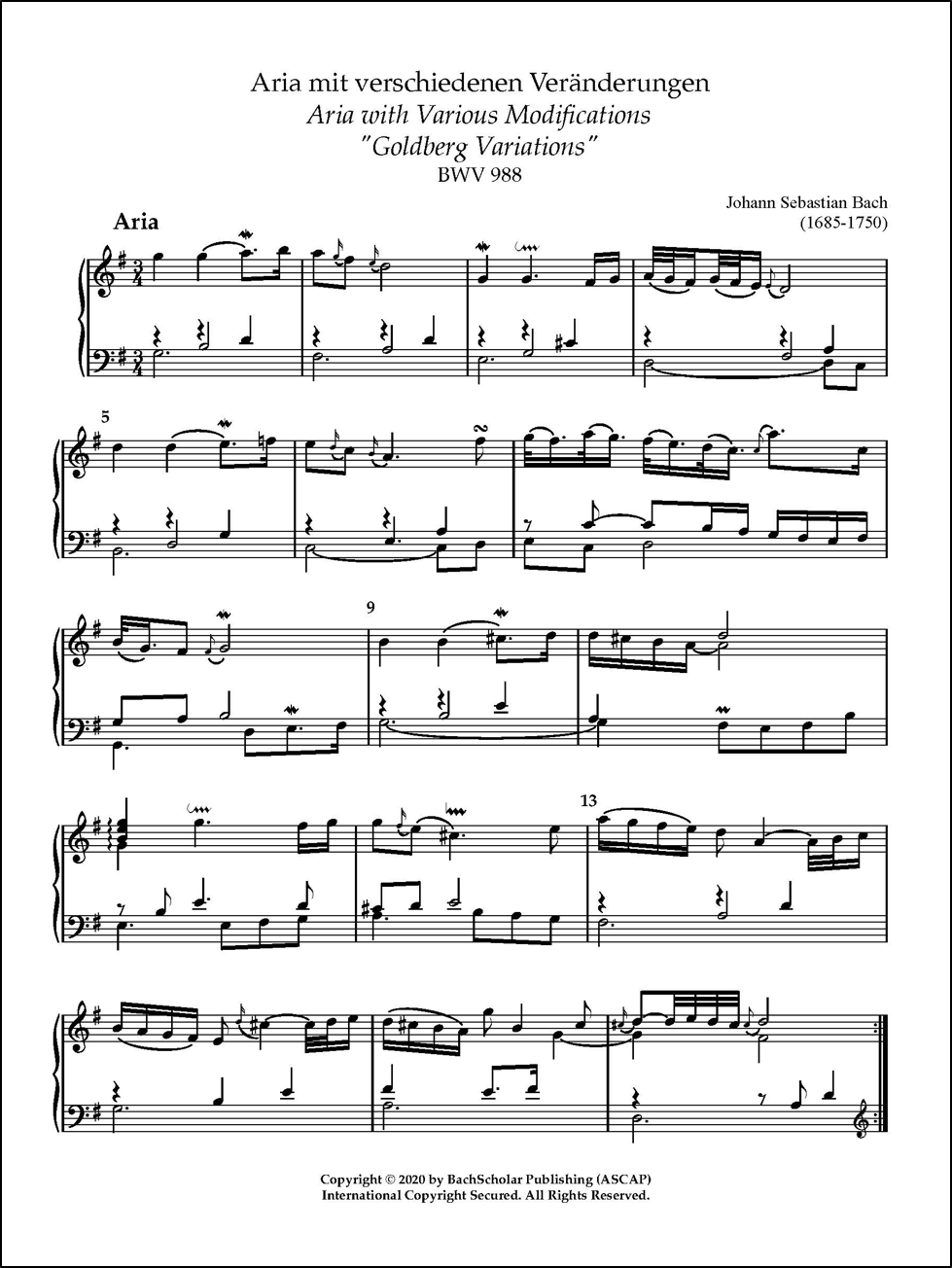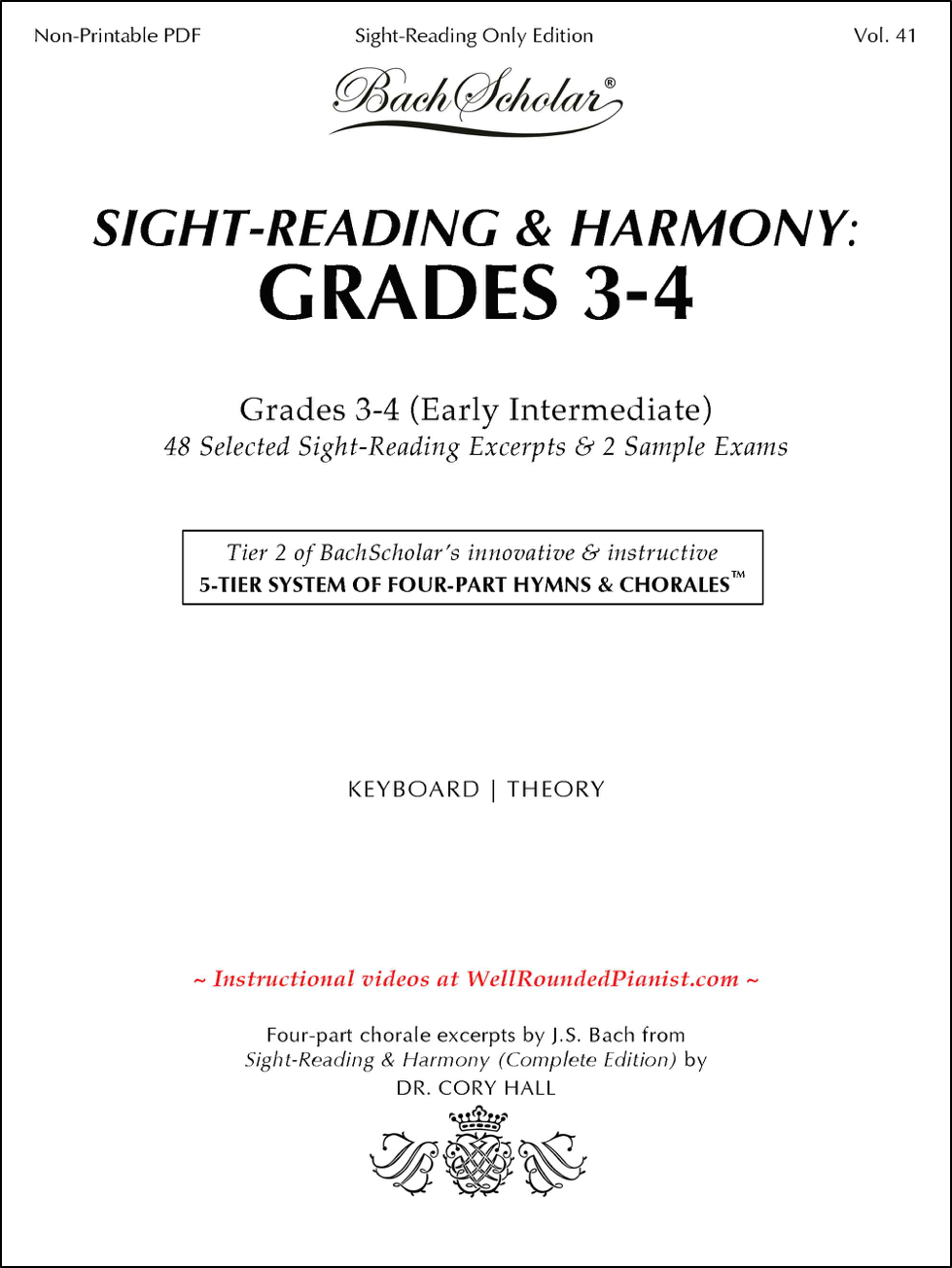J.S. BACH: Goldberg Variations, BWV 988
ATTENTION (NO REFUNDS FOR DIGITAL ORDERS): This download consists of a high-quality, non-printable PDF for iPads, tablets, and computers. A hardcopy print version of this book can be ordered from two places: AMAZON.COM or SUBITO MUSIC ONLINE STORE.
ABOUT THIS BOOK: Goldberg Variations, BWV 988 (3-page Preface, 63 pages, edited for piano, no fingerings). This attractive Urtext of Bach’s popular variation cycle is not only extremely user-friendly and extra-legible, but in addition, presents groundbreaking performance practice research that explains Bach’s never-before-revealed plan of tempo relationships between variations. This discovery is highly significant with regards to the tempi chosen for the 30 variations in a complete performance. The first edition from 1741, engraved by Bach himself, shows fermatas after some, but not all, variations. Most editors assume this was an oversight by Bach, and thus, add fermatas where they do not belong. Virtually all editions of our time add fermatas where Bach did not indicate them. Perhaps the only edition that correctly reproduces Bach’s fermata indications is Peters (ed. Kurt Soldan, 1937). Mapping out Bach’s fermata plan for the complete cycle reveals an ingenious and fascinating symmetrical arrangement of pairs and groups of variations unified by direct tempo relationships. Bach’s tempo plan has never yet been honored by commercial artists because they have been steeped in false, 19th-century tempo traditions, they have been too influenced by Glenn Gould, and they have never been made aware of Bach’s use of fermatas due to faulty editions. Bach’s master plan is beautifully laid out and all the tempo relationships are explained in the three-page Preface, which also contains a tempo hierarchy matrix relevant to Bach performance as well as Bach’s well-known Table of Ornaments. This edition is ideal for pianists from the late-intermediate levels and higher as well as concert artists, scholars, and teachers who seek an informative edition of the Goldberg Variations for the concert hall or teaching studio.
ATTENTION (NO REFUNDS FOR DIGITAL ORDERS): This download consists of a high-quality, non-printable PDF for iPads, tablets, and computers. A hardcopy print version of this book can be ordered from two places: AMAZON.COM or SUBITO MUSIC ONLINE STORE.
ABOUT THIS BOOK: Goldberg Variations, BWV 988 (3-page Preface, 63 pages, edited for piano, no fingerings). This attractive Urtext of Bach’s popular variation cycle is not only extremely user-friendly and extra-legible, but in addition, presents groundbreaking performance practice research that explains Bach’s never-before-revealed plan of tempo relationships between variations. This discovery is highly significant with regards to the tempi chosen for the 30 variations in a complete performance. The first edition from 1741, engraved by Bach himself, shows fermatas after some, but not all, variations. Most editors assume this was an oversight by Bach, and thus, add fermatas where they do not belong. Virtually all editions of our time add fermatas where Bach did not indicate them. Perhaps the only edition that correctly reproduces Bach’s fermata indications is Peters (ed. Kurt Soldan, 1937). Mapping out Bach’s fermata plan for the complete cycle reveals an ingenious and fascinating symmetrical arrangement of pairs and groups of variations unified by direct tempo relationships. Bach’s tempo plan has never yet been honored by commercial artists because they have been steeped in false, 19th-century tempo traditions, they have been too influenced by Glenn Gould, and they have never been made aware of Bach’s use of fermatas due to faulty editions. Bach’s master plan is beautifully laid out and all the tempo relationships are explained in the three-page Preface, which also contains a tempo hierarchy matrix relevant to Bach performance as well as Bach’s well-known Table of Ornaments. This edition is ideal for pianists from the late-intermediate levels and higher as well as concert artists, scholars, and teachers who seek an informative edition of the Goldberg Variations for the concert hall or teaching studio.
ATTENTION (NO REFUNDS FOR DIGITAL ORDERS): This download consists of a high-quality, non-printable PDF for iPads, tablets, and computers. A hardcopy print version of this book can be ordered from two places: AMAZON.COM or SUBITO MUSIC ONLINE STORE.
ABOUT THIS BOOK: Goldberg Variations, BWV 988 (3-page Preface, 63 pages, edited for piano, no fingerings). This attractive Urtext of Bach’s popular variation cycle is not only extremely user-friendly and extra-legible, but in addition, presents groundbreaking performance practice research that explains Bach’s never-before-revealed plan of tempo relationships between variations. This discovery is highly significant with regards to the tempi chosen for the 30 variations in a complete performance. The first edition from 1741, engraved by Bach himself, shows fermatas after some, but not all, variations. Most editors assume this was an oversight by Bach, and thus, add fermatas where they do not belong. Virtually all editions of our time add fermatas where Bach did not indicate them. Perhaps the only edition that correctly reproduces Bach’s fermata indications is Peters (ed. Kurt Soldan, 1937). Mapping out Bach’s fermata plan for the complete cycle reveals an ingenious and fascinating symmetrical arrangement of pairs and groups of variations unified by direct tempo relationships. Bach’s tempo plan has never yet been honored by commercial artists because they have been steeped in false, 19th-century tempo traditions, they have been too influenced by Glenn Gould, and they have never been made aware of Bach’s use of fermatas due to faulty editions. Bach’s master plan is beautifully laid out and all the tempo relationships are explained in the three-page Preface, which also contains a tempo hierarchy matrix relevant to Bach performance as well as Bach’s well-known Table of Ornaments. This edition is ideal for pianists from the late-intermediate levels and higher as well as concert artists, scholars, and teachers who seek an informative edition of the Goldberg Variations for the concert hall or teaching studio.









